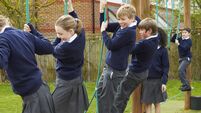Colman Noctor: Five top tips for maintaining children's mental health in 2022

Picture: iStock
Caught up in the ‘new year, new me’ hype, many parents aim high: ‘This year I plan to play with my children, keep them off their devices, keep my relationship alive, cook nutritious meals, have my own career and aspirations, meditate, go out with friends (because it’s not all about being a parent), walk 10,000 steps a day and workout five times a week.
When we set ourselves new-year targets, we hope they will be transformative. But we fail to consider that we make these pledges in January, the gloomiest of months, and over promise, setting ourselves up for failure.










